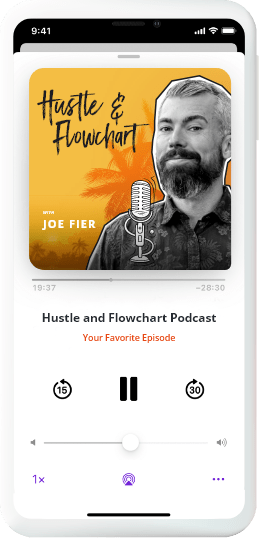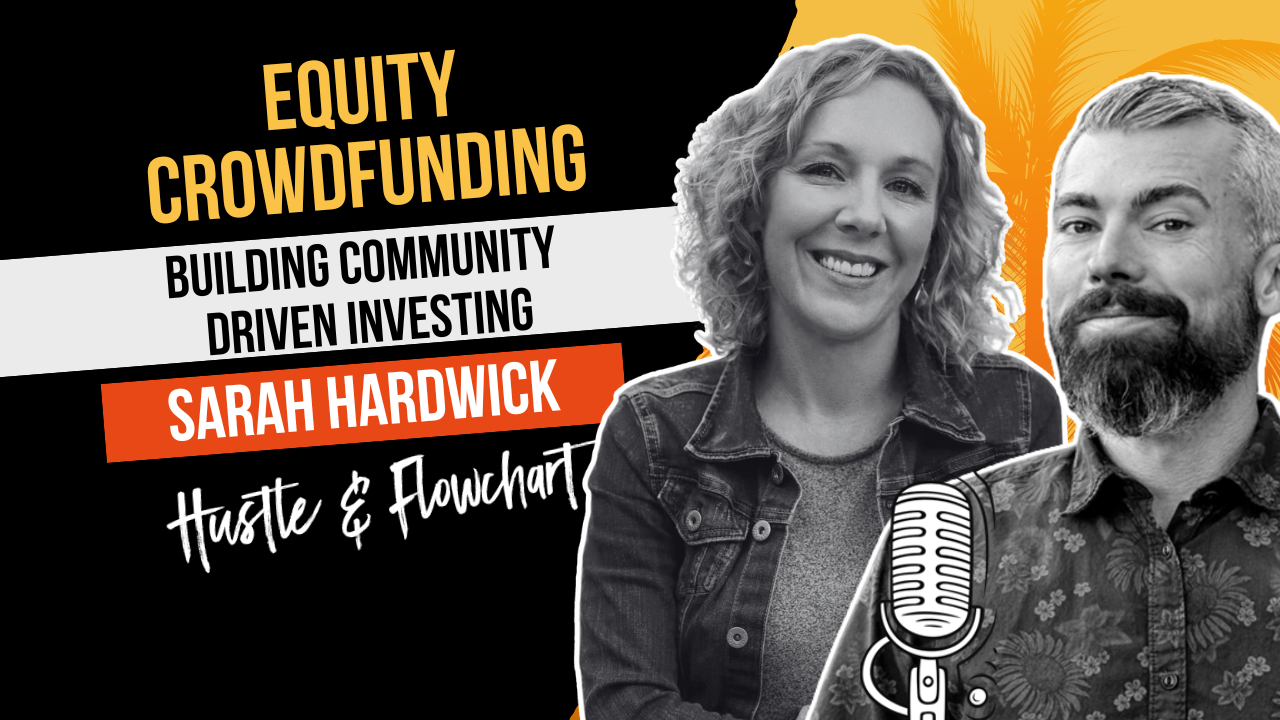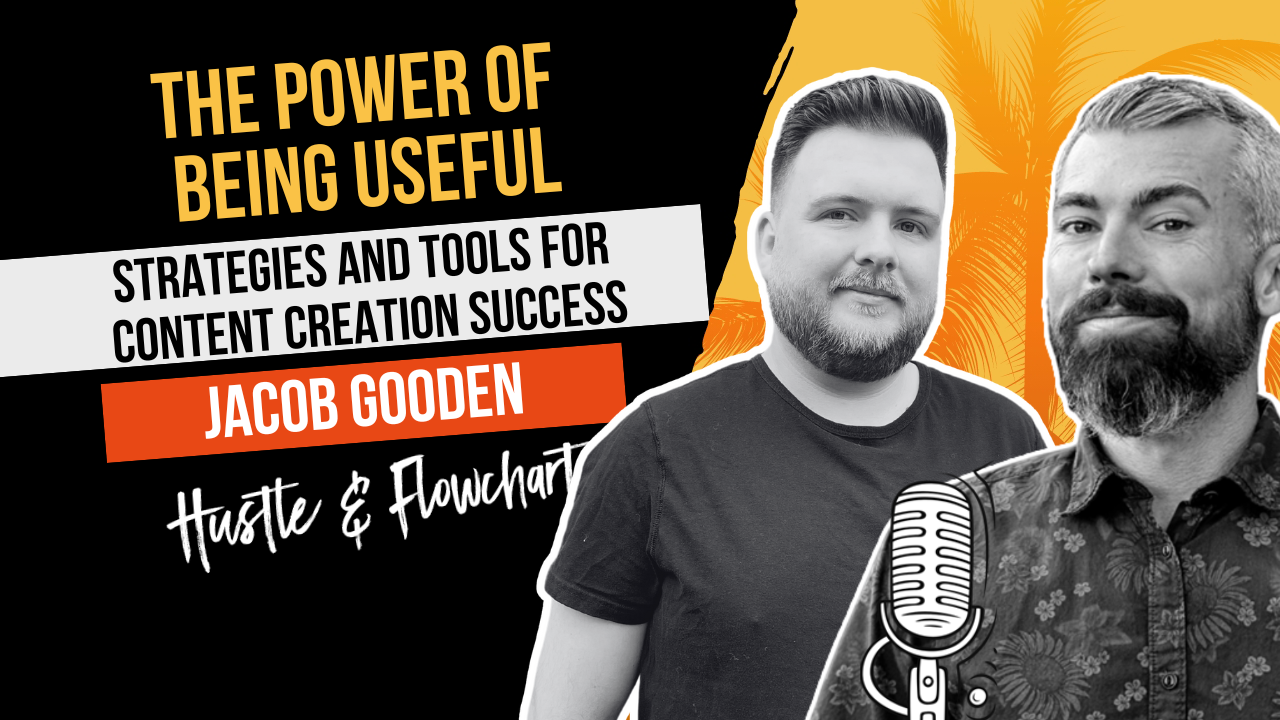[adrotate group=”8″]
Content Marketing
This is the first episode of The Authority Multiplier Podcast (Renamed Authority Insider). However, I didn’t want this to be your typical “first episode”, where it’s just an explanation of what the podcast will be. Instead, I wanted this to provide you with valuable tips and advice about becoming an authority in your niche.
The concept behind this podcast is that each week will discuss a different topic around creating authority and building a brand so that you can be the recognized leader in your niche… This means you can command higher prices and be the “top of mind” expert when someone needs the product or service that you or your company provides.
This episode dives into content marketing, why it’s important, and how you can quickly get started, even if you don’t have a lot of time or ideas for content. It’s a topic I’ve been discussing a lot lately and it’s kind of what I’m known for.
Grab a pen and paper, get ready to take notes, and settle in to really learn how to start becoming the authority, starting with content marketing efforts.
Resources Mentioned
- Explanation of How I’m Creating This Podcast
- James Altucher
- Choose Yourself / Choose Yourself Guide To Wealth
- Buzzsumo
- Yahoo Answers
- Quora
- Problogger Job Board
- Audacity
- Evernote
- Rev.com
Quotables
Get in the habit of keeping up with these four things, you will never run out of ideas for content for your blog. Share on X Hire someone to do the research and write a rough draft, then you edit it and make it your own. Share on XQuote Contest
Listen to this podcast episode and tell us your favorite quote from the episode and win a $10 Amazon gift card
. Simply type your favorite quote from this episode into the comments section below. If we choose your quote and share it on our Instagram page here, we will shoot you a gift card for $10 bucks to be used on Amazon.com. Since this contest is so new, and there are not a lot of comments yet, your chances of winning are huge!
Transcript
[mks_toggle title=”Open Transcription” state=”close “]What is up, everyone? Welcome to the Authority Multiplier Podcast. This is the very first episode, and I am your host, Matt Wolfe from ‘Multiplyauthority.com’. Now, the purpose of this podcast is to essentially bring on some really cool guests and pick their brains about how they’ve managed to build authority, how they’ve managed to build a brand. That is one of my ultimate goals. That’s something I’m constantly trying to achieve myself, so it just makes sense to make a podcast and find people that are smarter than me, that have achieved more than me in that area, and ask them questions and find out how they’ve managed to do it.
The whole idea behind this podcast is to bring in authorities in their various niches, and then ask them how they’ve managed to build that authority. We’re going to talk about things like content marketing, building a blog, getting featured in big publications, getting on TV, getting on the radio, getting in magazines, all sorts of topics around just building up your authority and your name recognition and your brand in whatever niche you’re in. That’s the point of this podcast. I didn’t want this first episode to be just your standard, typical introduction to what this podcast is. I wanted to make sure I gave some real, real high quality, good value right from episode one so that you’re getting an example of the type of podcast this is going to be and the type of stuff we’re going to talk about.
Now, this episode, I do not have a guest. This first episode is going to be purely me talking to you, giving you some tips, but future episodes, we’ll have guests on them, and we’ll pick their brains and we’ll get ideas from them. Now, I do want to tell you that if you go to ‘Authorityinsider.net,’ that is the premium community attached to the Authority Multiplier Podcast. That’s ‘Authorityinsider.net‘. What we do over at Authority Insider is every time I do an interview with somebody, you get the video version of the interview.
You get behind the scenes access to the interview, the conversations that we have. You get all of the bonus footage and bonus training, and all sorts of additional stuff that the people that I’m bringing on to this podcast are teaching me outside of the actual podcast recording, so every time I record an interview for this podcast, there’s usually some conversation before we hit record and some conversation after I press stop on the recording. The Authority Insider is all of that additional information, all that additional discussion, all the stuff that we don’t necessarily talk about on the podcast. Typically, these guests are willing to divulge a whole bunch of additional information and all sorts of cool tips and strategies, and things like that that they don’t actually divulge on the show itself. It’s content that they want to keep behind closed doors and not share with such a wide audience.
They allow me to record those additional conversations and put them in the members area, but it’s not stuff that they necessarily want to this wide audience that this podcast reaches. That information is all available inside of ‘Authorityinsider.net‘, as well as bonus training from me, bonus training from other guest experts, and my archives of all the old podcasts I’ve done in the past, all the old trainings I’ve done in the past. I’ve been putting it all inside of Authority Insider. That’s my hub. That’s my vault. That’s where all of this additional bonus training goes, and it’s just amazing content.
I couldn’t be more excited about the stuff that’s inside of Authority Insider, and I know you’re going to love it. There’s a lot to learn in there. Anytime these guests bring on extra strategies and share these extra strategies; I like to take all this additional recordings, all this additional information and make sure it’s inside of ‘Authorityinsider.net‘. Go check that out. Go to ‘Authorityinsider.net‘. Make sure you’re signed up as a member.
Right now, I’m offering a one dollar trial. No guarantees that the one dollar trial will last forever. By the time you’re listening to this, it may be gone. Go over to ‘Authorityinsider.net‘ and make sure you’re a member because you’re going to want all that additional footage and additional training that these guests have to offer. All right?
Let’s dive right into today’s discussion which is around content marketing and a whole bunch of ideas to make sure that you never run out of ideas for content and so that you can create content really, really quickly. Now, let me start by talking a little bit about what content marketing is and why it’s important. All right. Content marketing allows you to create content and essentially become the authority in your niche on whatever topic it is you’re talking about.
You create content. You put on your blog. You share it on other people’s blogs. You share it in various publications. You share it on sites like Medium and LinkedIn. Content is information that you’re putting out into the world to brand yourself as an expert on the topic you’re talking about.
Now, content is also the magnet to your business. Now, a lot of sites out there like to create what I call ‘Online business cards.’ Now, what I mean by an online business card is one of those sites where you go to this site, and they might have like an image of their business and the address and a phone number, and that’s really all that their website is. That’s like a business card, and it doesn’t really do much for you online.
You’re not really going to get a lot of results. You’re not going to get a lot of traffic to it. It doesn’t really help your business much. Now, if you have a content marketing strategy, typically, it means you’ve got a blog element attached to your website where you’re creating content, you’re sharing additional information, and you’re acting like the authority in whatever niche it is that you’re in. You’re creating this content to attract people to your site.
Now, if you have this content, you have something that people will want to share on Facebook, something that people will want to share on Twitter, something that Google will probably rank and move up their search engines because people are enjoying the content. That’s why you create the content for your business. If you’ve already got a business, it’s important to add a content marketing strategy so that people have a reason to go to your website. Now, once you’ve created this content and you’ve created this magnet that attracts people over to your website, that’s when you can start putting your offer in front of them. Now, another benefit of content marketing is it’s a way to indoctrinate people to you.
It’s a way that you can build goodwill with your followers, with your potential customers with your leads. You create this content, and people start to get to know you through your content, and people buy from people that they know, like and trust. You’ve probably heard this over and over again if you’re in business. People buy from people that they know, like, and trust. If you’re putting content on your website, you’re building that know, like, and trust factor, and you’re essentially indoctrinating people to you so that they feel like they know you, and you’re top of mind when they’re ready to make a purchase.
That’s what content marketing is. That’s why I focus so much on content marketing because I feel it’s important for every business. Now, some businesses are purely content businesses. The majority of what I do in my business is a pure content business. I sell content, and I attract people to the content that I sell by creating more content.
That’s my entire business. My entire business is built around creating content, content like this podcast you’re listening to right now, content like my blog posts, content like this stuff I share on LinkedIn and Medium and sites like that. That all attracts people to me. It indoctrinates them to me, and it allows me to put my paid content in front of them. Now, if you have a brick and mortar business that sells let’s say shutters …
I used to be in the shutter industry. Let’s say you sell shutters. If you had a blog that talked about window coverings and the benefits of shutters and why shutters are the most important window covering, the best window covering out there, you’re going to indoctrinate people and build yourself as an authority in the shutter world, and you’re going to be top of mind when people are ready to purchase shutters. All right? That’s why we focus on content marketing. That’s why I feel content marketing is important.
All right. Let’s talk a little bit about getting ideas for content. Now, when it comes to content marketing, I did a little survey to my list. I said, “What are the things that you get the most held up with for content marketing? Why are you not doing content marketing in your business yet?”
The two top responses that came to me through that survey was one, “I Don’t have enough time to create content. It just seems really time-consuming”, and two, “I don’t know what to write about. I don’t know what to create content on.” All right? In this episode, I’m going to tackle both of those.
Let’s start by talking about getting ideas for content. Now, the first concept that I want to talk about when it comes to getting ideas for content is becoming an idea machine. Now, this strategy comes straight from James Altucher who wrote a book called ‘Choose Yourself‘ and ‘The Choose Yourself Guide To Wealth‘ which are both books that I highly, highly, highly recommend. I love those books. He talks about the idea of the idea machine.
What the idea machine is is every single day, without fail every day, you’d get in the habit of writing down ten ideas. They don’t have to be good ideas. They just have to be ideas. They don’t even necessarily have to be ideas for your business. You just want to get in the habit of writing down ten ideas every day.
Now, I do this for blog posts. Every day, I try to write down ten ideas for future blog posts, and it’s really, really difficult to come up with ideas all the time. The first three ideas might be somewhat easy, but the seven other ideas become really, really difficult because you’re trying not to duplicate ideas that you’ve already written down in the past. Every day gets a little bit harder, but over time, you do what James would call ‘Build that idea muscle.’ It gets easier and easier, and you just become really good at coming up with ideas.
All right. That’s concept number one. Now, concept number two is find existing popular content that’s already out there and recreate that content with your own voice. There’s a site called ‘Buzzsumo.com‘ which I highly recommend checking out. They have a free version and a paid version, but the free version, for the most part, will do what you want.
You go to BuzzSumo, and you type in your keyword. You type in your niche. What you’ll find is a list of all of the most popular articles in that niche from various other websites. You can just keep a running list of what the most popular articles around the web are on your niche and find ways to rewrite them, add your own voice to those same topics and create blog posts on that. All right. That’s another idea for getting ideas for content.
Now, a third idea is to tap podcasts. Go find very popular podcasts in your niche. Do a search on iTunes for a podcast in your niche, and you can actually look at the iTunes podcasts and essentially find out what the most popular episodes of each podcasts are. Now, if you look at those episodes and look at the titles of the episodes, you’ll get all sorts of ideas for potential blog posts. You’ll find the most popular episodes from each show, and those are potential blog posts.
If you need inspiration for what to talk about on your blog post, just listen to those episodes. That’s all you have to do. Go listen to some podcast episodes and you’ll get all sorts of ideas for blog content. Another way that I like to get ideas for blog content is I go to ‘Answers.yahoo.com‘, and I go to ‘Quora.com‘. If you go to one of those two sites, and you type in the name of your niche, you’ll find all sorts of people asking questions about that niche.
Now, what you want to do is take those questions that people asked and turn your response to those questions into a blog post, so you’re finding what are popular questions, what are common questions that people ask over on these question sites, and you’re answering them in your own blog post. Now, you can go back to those question sites and post a link back to your blog post and say, “Hey. I answered this question over here” and get a little extra traffic from it, but that is a great way to find potential ideas for content. All right. Those are just a few ways that you can never run out of ideas for content.
Just to quickly recap, one, become an idea machine. Write down ten ideas every single day. Get in the habit of writing down those ten ideas. Build that idea muscle, so you get really used to it, and it becomes really easy for you to come up with ideas. Number two, find existing popular content. Go to a site like ‘BuzzSumo‘. Do a search for your keyword, and find out what the most popular articles are that people are already sharing, that people are already really, really enjoying and write similar articles in your own voice.
Three, tap podcast. Go find podcasts in your niche on iTunes and look at those podcasts for the most popular episodes, and write a list of potential blog post ideas based on those episodes, and actually listen to some of those episodes to get more inspiration for things you can talk about in your blog post. Four, answer very common questions. Go to ‘Answers.yahoo.com‘. Go to ‘Quora.com‘, and find common questions that people are asking in your niche. Write blog posts with your answers to those questions.
You do these four things; you get in the habit of keeping up with these four things. You will never, ever, ever run out of ideas for content for your blog. I promise.
Now, you’ve got plenty of ideas for things to actually blog about on your blog. This works regardless of what niche you’re in. You can do all of those strategies I just talked about in any niche. It doesn’t matter. Any business. That’s a way to get ideas for content.
All right. The other objection people had when I surveyed the list was not having enough time to create content. I want to crush that right now and give you some ideas to really, really rapidly create content. I’m going to start by talking about my absolute favorite way to generate a ton of content. I do this on my blog all the time.
I love this strategy. I’ve used it over and over again, and people are none the wiser that I’m even doing this other than the fact that I’m openly sharing the fact that I’m doing this nowadays. All right? What I like to do is I’d go to a site called ‘Jobs.problogger.net‘. It’s a job board where you can post a job listing. It costs $50 to post a job listing there, and you can look for potential writers for your blog.
It costs 50 bucks, but you’ll probably get somewhere between 70 and 100 responses from various writers that want to write for your blog. What you’re looking for is someone who can essentially do a little bit of research for you and write a rough draft for you, so you’re going to give them an idea. They’re going to do a little bit of research, and they’re going to write a quick rough draft for you somewhere in the range of 700 to 1,200 words. Okay?
You get that rough draft from them, and now, all the hard work is done. One of the hardest parts about writing a blog post is staring at a blank screen. You’re just staring at a blank, empty screen, and you need to start typing, and you just don’t know what to start typing. That is the hardest part about writing a blog post, and a research is very time-consuming. If you have somebody take those two hard parts away, they do the research, and they do the rough draft for you, you’ve bypassed all the most difficult part of blogging.
Now, you take this rough draft, and you just rework it and you make it your own. You reword it, so it’s in your own voice. You add some imagery to it. You add maybe a couple of extra paragraphs. You’ll probably read through it and find some additional details that you want to add in that maybe your original writer didn’t think about, but you’ll add to it, and you’ll make this post your own, but all the hard work is already done for you.
Now, here’s a bonus tip. I like to find people who already have social media followings, who already have Twitter followings or Facebook followings, and ask them when I’m about to hire them for the job. Once this post is live, will they be willing to share it on Twitter and Facebook? Now, I always get asked, “Aren’t these people ghost writers? Why would they want to share it?”
Here’s the thing. Sometimes, I have them be ghost writers, and sometimes I give them credit. Either way, when they’re applying for the job, and they want to get paid to write, then they’re pretty willing to do what you ask them to. If you say “Hey. I’m going to hire you for this gig, but I do have one stipulation. Once this is written and posted, even though it’s under my name, will you be willing to share it to your social media following?”, and a hundred percent of the time so far for me they’ve always said “Yes. Of course I’ll share it.”
Yes, they’re ghost writing it. No, their name is not on it, but they’ll be willing to share it because they want the gig. They want to make the money for writing it, so I always try to find people that have social media followings and get them to share these posts as well. Now, the next common question, “How much should I expect to pay?” I’d pay anywhere in the range of 30 to $50 for this service to get a research and rough draft done. All right?
That’s the first idea and that’s the one that I use most commonly to create a lot of content very quickly. Now, another way to create a lot of content very quickly is to actually speak your content. You can use a tool like Audacity or even Evernote has a voice recorder in it. What you do is you just come up with an idea of something you want to talk about, and you just speak it out. You just talk about everything you want to say in this post, and you speak it out, and then you go to a site called ‘Rev.com‘. That’s ‘Rev.com‘, and you send them the audio file. They will send you back a transcription.
Now, once again, that transcription won’t be perfect. It won’t read like a blog post. It’ll read like a transcription, so what you’re going to want to do is you’re going to want to put it into your WordPress blog post editor and tweak it a little bit so that it reads like a blog post instead of reads like a transcription. Again, the hard part is done. You’re not staring at a blank screen, and you have a starting off point with that content. All right. That’s another way to get a lot of content.
A third way to get a ton of content is to solicit guest writers. On your blog, actually put a tab up in the upper menu of your blog for ‘Write for us’. On that ‘Write for us’ page, give people instructions for becoming a guest blogger. Allow them to contact you, put a contact form on that page, and tell them to contact you with ideas for guest posts and allow guest writers on your blog. Now, this is easier to do once your blog gained some traction and you have a little bit more of a following, but it’s good to do it from day one and you will probably get people from time to time contacting you about guest writing.
Now, you can also go find other blogs, other popular bloggers out there and ask them if they want to write for your blog. Some of them might throw you a bone and write a quick article for you if you promise to share it on your social media and give them some sort of “What’s in it for them?”, share it to their social media, help expand their name expand their brand. You can solicit guest writers. All right. You can do roundup posts.
A roundup post would be a post where you get a whole bunch of people to give you an answer to a question. Maybe you’ll say … Let’s say I’m writing a blog post about SEO and I asked 50 different SEO experts the question “What is your number one SEO tip?” I ask that question to 50 people through email, and 30 of them emailed me back. I’ve got a blog post that I can write now.
I can copy and paste all of these quotes that these people gave me into a blog post and link back to all of their websites and all of their Twitter accounts. Then, once this blog post goes live, I can reach out to every single person who contributed to the post, tell them that the post is live, and a large percentage of those people are going to share that post with their following. All right. That’s another way to create content really, really fast. You essentially get other people to create the content for you by asking a whole bunch of people a single question, and then rounding up everybody’s answers into a single post.
All right. Those are some really, really good ways to create content really quick. Just again, to recap my favorite way is to go to ‘Jobs.problogger.net‘. Hire somebody to essentially do the research and write a rough draft for me, and then I’ll edit it, make it my own, add my own voice, add some images, and turn it into a blog post that sounds like me. Another great way is to speak to your content, so you record the audio onto your computer. You send an audio file to ‘Rev.com‘, get the transcription, and then edit that file into a blog post.
You can solicit guest writers where you have a tab on your blog where you ask people to submit guest contributions to you, or you can go around, find other bloggers, and specifically ask them if they want to come right for you, and you might get a few. You can do a roundup post where you ask a single question to several different people roundup all of their responses and put them on your blog. Those are some of my favorite ways to rapidly really quickly create content. Now, I do have one little bonus tip before I wrap up today’s episode, and that is every single time I create a piece of content, every single time I create a blog post, whether it’s from my site or an external site, I like to link to other people. I like to mention people’s names.
I like to mention people’s businesses, people’s products. I like to mention other people’s stuff and link from my blog post to those people’s platforms or resources. The reason I do this is because every time I create a blog post and I have these links, I can now go on Twitter, and I can tweet at everybody that I mentioned and say “Hey. You’ve been mentioned in this blog post”, and a large percentage of those people who are mentioned in the blog post are going to share that post.
People love to be talked about. People love to be recognized. Just the simple fact of telling people, “Hey. I’m talking about you over on my blog post” usually gets people to share that content. If you don’t have Twitter, you can try to reach out to people through their contact forms on their websites or email them or, however, you want to try to get a hold of them. I typically use Twitter, and it’s a really, really, really effective strategy to get a lot of social sharing really early on when your blog post goes live.
All right. There you have it. Those are my best strategies for rapidly creating content and never running out of ideas for content. Now again, before I wrap up this first episode of the Authority Multiplier Podcast, I want to remind you to go to ‘Authorityinsider.net‘ and check that out. Right now, I currently have a one dollar trial going for it, and you’ll get all the behind the scenes of all of the podcast episodes I do.
Right now, there’s already something like 30 videos in there. Little known fact, I’ve already created a whole bunch of episodes for this podcast that are going to be released very, very soon and coming out right after this podcast, so a lot of that content is already created, a lot of training is already created, and there’s already a ton of interviews and behind the scenes footage, and bonus strategies and things like that that you can get early access to before it even goes live on the podcast. There’s content in there from people like Brad Spencer, Navid Moazzez, Chris Farrell, Ben Adkins, all sorts of great stuff in there right now that you can get access to today, bonus training on all sorts of topics around building your authority online, so make sure if you haven’t already, go check out Authority Insider. You are absolutely going to love it. You’re going to learn a ton, and every single week, you’re just going to be so happy that you can’t remember this thing because of all this additional bonus training that comes out every single week.
All right. That’s ‘Authorityinsider.net‘. Thank you so much for joining me on this first ever episode of the Authority Multiplier Podcast. I’ve got so many great episodes in the can already ready to be released, and I can’t wait to share them with you. Stick around. Make sure you’re subscribed if you’re not already, and I’ll see you in the next episode.[/mks_toggle]















